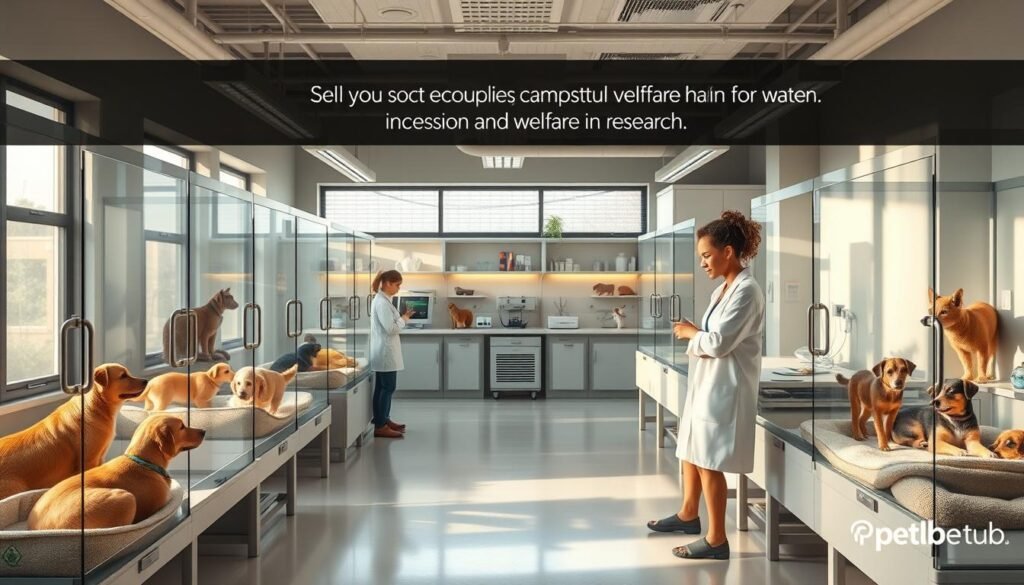As pet owners and caring people, we must look after the animals we care for. This includes our pets, farm animals, and wildlife. We need to focus on treating animals ethically. In this article, we’ll answer 8 important questions about animal welfare. We’ll cover what it means, why it’s important, and how it affects our world.
Key Takeaways
- Animal welfare includes their physical, mental, and emotional health.
- Looking after pets, farming animals humanely, and protecting wildlife are key.
- It’s important to spot and report animal cruelty or neglect.
- Animal shelters and rescue groups help care for and find homes for animals in need.
- Supporting policy changes can help improve animal welfare on a big scale.
What Is Animal Welfare and Why Does It Matter?
Animal welfare is about keeping animals safe and happy. It means they don’t go hungry, thirsty, or feel pain. It’s also about giving them the care they need to live well.
Animals can feel emotions like pain and happiness. So, treating them right is very important.
Defining Animal Welfare
Animal welfare covers many parts of an animal’s life. It looks at their health and if they can act naturally. It also checks if they’re mentally okay, without fear or stress.
The Importance of Ethical Treatment
Good animal welfare means less cruelty and a kinder world. Treating animals well is not just right; it’s also good for us. It makes us more caring and empathetic.
Looking out for animals is a big moral duty. It shows we care for all living beings. By focusing on animal welfare, we help make a better world for everyone.

“The greatness of a nation and its moral progress can be judged by the way its animals are treated.” – Mahatma Gandhi
Animal Welfare in Companion Animals
As pet owners, we have a big role in making our furry friends happy and healthy. It’s not just about feeding and housing them. We must meet all their needs to keep them well.
Responsible Pet Ownership
Being a responsible pet owner means knowing what our pets need. This includes a good diet, enough exercise, and grooming. We also need to create a loving home that meets their physical and emotional needs. By focusing on these, we help our pets live a happy life with us.
Veterinary Care and Preventive Medicine
Regular vet visits and preventive care are key for our pets’ health. They help catch health problems early and keep our pets safe from parasites. Working with our vets ensures our pets get the care they need. This proactive approach also saves us from expensive vet bills later on.

By being responsible pet owners and getting our pets the care they need, we build a strong bond. This commitment to animal welfare helps create a society that cares for all living beings.
Farm Animal Welfare
Farm animals, like livestock and poultry, deserve our care and respect. It’s not just right; it’s essential for the animal agriculture industry to be sustainable and responsible. High standards of farm animal welfare are key.
Humane Practices in Animal Agriculture
Looking after farm animals is more than just meeting their basic needs. It’s about creating a better life for them. This means:
- Providing enough space for them to roam, forage, and socialize.
- Reducing stress and pain through gentle handling and proper housing.
- Access to vet care and medicine to keep them healthy.
- Treating each animal with kindness and respect.
By following these humane practices, the animal agriculture industry can make a big difference. It improves the lives of farm animals and boosts the industry’s reputation. This helps the whole food system and makes it more ethical and responsible.
| Humane Practices | Benefits |
|---|---|
| Adequate living space | Allows natural behaviors and reduces stress |
| Gentle handling and management | Minimizes pain and distress |
| Preventive veterinary care | Proactively addresses health issues |
| Compassionate treatment | Enhances animal welfare and public perception |
By adopting these humane practices, the animal agriculture industry can lead the way. It promotes farm animal welfare and supports a more ethical and sustainable food system. This benefits both the animals and the community.
Animal Welfare in Research and Testing
Using animals in research and testing is a big ethical issue. Science and medicine need animal studies, but we must treat animals well. We should try to use other methods when we can.
Animal welfare is very important in research and testing. We need to find a balance between scientific progress and treating animals right. This is a tough issue that needs careful thought and a strong commitment to animal welfare.
Humane Practices in Animal Research
Researchers and places doing animal studies must follow strict rules. These rules help keep animals safe and comfortable. They also try to find other ways to do research that don’t use animals.
Alternatives to Animal Testing
- Computer simulations and models
- In vitro studies using human or animal cells and tissues
- Organ-on-a-chip technologies
- Epidemiological studies and human clinical trials
By using these alternatives, we can use fewer animals in research. This helps science and medicine grow in a kinder way.
| Animal Welfare Considerations | Alternatives to Animal Testing |
|---|---|
| Minimizing pain and distress | Computer simulations and models |
| Providing appropriate housing and care | In vitro studies using human or animal cells and tissues |
| Reducing the number of animals used | Organ-on-a-chip technologies |
| Exploring alternative research methods | Epidemiological studies and human clinical trials |
We must keep animal welfare high in research and testing. This is a big challenge, but we’re ready to face it. We aim to do this with care, kindness, and solid evidence.

“The greatness of a nation and its moral progress can be judged by the way its animals are treated.”
– Mahatma Gandhi
Wildlife Conservation and Habitat Protection
It’s crucial to protect wild animals and their homes. Threats like habitat loss, poaching, and climate change need to be tackled. We must use sustainable practices and manage resources wisely. This way, we can keep ecosystems healthy and diverse.
Threats to Wildlife Populations
Habitat destruction and fragmentation are big problems. As humans take over more land, animals struggle to survive. Poaching, especially for valuable species like rhinos and elephants, is another major threat.
Climate change is also a big worry. It can mess up ecosystems, causing many species to decline or disappear. We need a broad plan that includes conservation, sustainable practices, and community involvement.
Promoting Sustainable Practices
- Implement sustainable land-use planning and zoning policies to protect wildlife habitats and corridors.
- Promote ecologically responsible tourism and recreation activities that minimize the impact on natural environments.
- Support sustainable agriculture and forestry practices that prioritize biodiversity and ecosystem health.
- Invest in renewable energy sources to reduce the carbon footprint and mitigate the effects of climate change.
- Strengthen law enforcement efforts to combat poaching and the illegal wildlife trade.
- Engage local communities in conservation efforts, fostering a sense of stewardship and ownership over natural resources.
By adopting sustainable practices, we can protect our natural world. This helps ensure the survival of many wildlife species. Together, we can safeguard habitats and ecosystems for all living beings.

Animal Cruelty and Neglect
Animal cruelty and neglect are big problems that need our help. It’s important to know the signs of abuse, like physical injuries or changes in behavior. We must strengthen laws and enforcement to stop animal suffering.
Recognizing Signs of Abuse
Spotting animal abuse is key to helping them. Look out for:
- Visible physical injuries or wounds
- Severe malnourishment or dehydration
- Unusual or aggressive behavioral changes
- Lack of veterinary care or grooming
- Unsanitary living conditions or lack of shelter
Legal Protections and Enforcement
Laws protecting animals have gotten better. But, we need to do more to enforce them. Focus areas include:
- Enhancing penalties for animal abuse and neglect offenses
- Improving reporting and investigation procedures
- Expanding resources for animal welfare organizations and law enforcement
- Promoting collaboration between different agencies and stakeholders
Together, we can fight animal cruelty and animal neglect. With strong legal protections and enforcement, we can make a better world for animals.

The Role of Animal Shelters and Rescues
Animal shelters and rescue groups are key in caring for animals in need. They offer a safe place for pets that are abandoned, abused, or without a home. Their work helps reduce the number of animals on the streets and improves their lives.
Adoption and Foster Programs
Adoption and foster programs are big ways shelters and rescues help. These programs let people give animals a temporary or forever home. Adopting a pet from a shelter not only gives a loving home but also frees up space for others.
Fostering is also very impactful. It lets you care for a pet temporarily. This helps the animal adjust, get medical care, and become more adoptable. It also helps shelters and rescues focus on other animals needing help.
| Adoption Benefits | Fostering Benefits |
|---|---|
| Provides a loving, permanent home | Offers temporary care and rehabilitation |
| Frees up space for other animals in need | Helps shelters focus resources on other animals |
| Reduces the number of homeless pets | Prepares animals for successful adoption |
By supporting your local animal shelter, you can change many lives. Whether you adopt, foster, or volunteer, your efforts can greatly improve the lives of animals.

“Adopting an animal from a shelter or rescue not only provides a loving home but also helps reduce the number of homeless pets in our communities.”
Animal Welfare in 8 Questions
Animal welfare is a complex topic that deals with the well-being and ethical treatment of animals. It covers many areas, from pets to wildlife. Let’s look at 8 key questions to understand this important issue better:
- What is the definition of animal welfare? Animal welfare means ensuring animals are physically, mentally, and emotionally healthy. It’s about making sure their needs are met for a good life.
- Why is animal welfare important? It’s vital for reducing suffering and showing respect for animals. It helps create a more caring and responsible society.
- How does animal welfare apply to companion animals? Taking care of pets involves being a responsible owner. This means getting them vet care and meeting their physical and emotional needs.
- What are the considerations for farm animal welfare? Farm animals need space, natural behaviors, and less stress. These humane practices are key for their welfare.
- How does animal welfare factor into research and testing? It’s important to treat animals ethically in research. This means reducing pain and suffering as much as possible.
- What is the relationship between wildlife conservation and animal welfare? Protecting habitats and reducing threats to wildlife is crucial. It helps keep wild animals safe and healthy.
- How can we recognize and address animal cruelty and neglect? We need to spot signs of abuse and support laws against it. Enforcing these laws is also important.
- What is the role of animal shelters and rescues in promoting animal welfare? Shelters and rescues are vital. They care for animals, find them homes, and advocate for their rights.
Understanding these aspects of animal welfare helps us build a more caring society. We can focus on the well-being of all animals, from pets to wildlife.
“The greatness of a nation and its moral progress can be judged by the way its animals are treated.” – Mahatma Gandhi
Ethical Considerations in Animal Welfare
Exploring animal welfare, we see a complex relationship between animal welfare and animal rights. These ideas share some similarities but also have key differences. Understanding these views helps us better care for animals.
Animal Rights vs Animal Welfare
The animal rights movement believes animals have inherent rights and moral status. It fights for their freedom and equal treatment. On the other hand, animal welfare focuses on making sure animals are physically and emotionally okay, even when they’re used by humans.
Animal rights activists push for ending all animal use. But animal welfare folks aim to make life better for animals in places like animal research, agriculture, and captivity. This difference shapes how they tackle animal issues.
- Animal rights stresses animals’ rights and freedom from human harm.
- Animal welfare aims to keep animals safe and happy, even in human use.
- These views lead to different ways of dealing with animal problems.
“The greatness of a nation and its moral progress can be judged by the way its animals are treated.” – Mahatma Gandhi
It’s important to understand the differences between animal rights and welfare. This knowledge helps us navigate the complex world of animal welfare, animal rights, and ethical considerations. By grasping these perspectives, we can strive for a kinder, more just world for all living beings.
How Can We Improve Animal Welfare?
Improving animal welfare is a team effort. It needs action from both individuals and big groups. We can all make a difference by choosing to help animals and push for better laws.
Individual Actions and Advocacy
Our daily choices can greatly help animals. We can adopt pets, support humane businesses, and speak out for animals. By living our values, we inspire others to do the same.
- Adopt pets from shelters, not puppy mills.
- Choose companies that treat animals well.
- Help local animal groups by volunteering or donating.
- Join efforts to make animal laws stronger.
Policy Changes and Legislation
We also need to push for better laws. Talking to our leaders can help make laws that protect animals. This way, we can ensure animals are treated right.
- Support laws that help animals, like those against factory farming.
- Push for local governments to enforce animal laws better.
- Speak up at public meetings to demand stronger animal policies.
Together, we can make a big difference. By working together, we can ensure animals are treated with respect and care.
Emerging Trends and Challenges
The field of animal welfare is always changing. New challenges and chances come up. Advances in vet care and animal behavior studies, plus more people caring about animal rights, shape the scene. Knowing these emerging trends and tackling ongoing challenges helps us tackle the complex issues of animal well-being.
One key trend is the push for evidence-based animal care. Scientists are studying animal behaviors and needs deeply. This gives us insights for better, kinder care and management of animals. For example, there’s progress in enrichment programs, pain relief, and species-specific care.
- Advancements in Veterinary Care: New treatments and ways to prevent illness are boosting animal health, both pets and wild ones.
- Behavior Research: Learning more about animal thoughts, feelings, and social needs helps us care for them better and train them more effectively.
- Public Awareness and Activism: Social media and campaigns are raising awareness of animal welfare issues. This is leading to positive changes in industries and policies.
But, challenges still exist. They happen where cultural norms, money, and old ways meet new animal welfare ideas. Solving these will need teamwork from policymakers, business leaders, scientists, and advocates.
“Promoting animal welfare is not just a moral duty, but also key to a better, kinder future for all living beings.”
As we face the changing world of animal welfare, staying alert, open, and dedicated to bettering things is vital. By embracing new trends and tackling challenges directly, we aim for a world where animal well-being is a main focus.
Preventing pet diseases
Building a Humane Society
To create a more humane society, we need a plan that involves many parts. Education and raising awareness are key. By teaching compassion and responsible care, we aim for a future where animal welfare is a core value.
Education helps us feel empathy, correct wrong ideas, and motivate people to act. We can teach communities about the value of kindness and their role in making the world better. This way, caring for animals becomes a part of our society’s values.
By sharing the struggles animals face and how we can help, we build support for animal care. A united effort from an informed public can lead to important changes. It helps in better pet care, responsible practices, and more. Together, we can build a kinder world for all.






